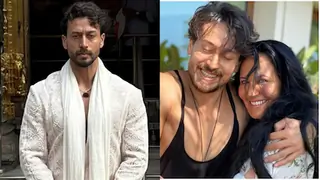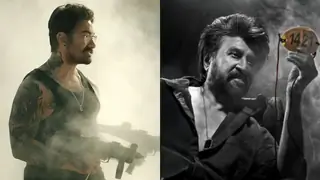| SAROD & GHAZALS | ||||
| JUGALBANDI Rajiv Vijayakar | ||||
| Ustad Amjad Ali Khan is the doyen of the sarod, an ancestral instrument for seven generations of the Senia Bangash Gharana. Pankaj Udhas has gained his greatest stature in ghazals, a genre that he took to every music listener through simplicity minus compromise. But Yaara, the new album composed by the Ustad for Udhas, has no sarod and no ghazal! Here's to musical flirtation! USTAD AMJAD ALI KHAN I look on my composing as a flirtation with music, with which my relationship is otherwise serious in my classical work with the sarod. So my first foray was 20 years ago when I composed the songs for the television serial Guftagu. Every episode was about the work of one legendary poet and we began with Ameer Khusrau. I had recorded 40 ghazals with singers like Shobha Gurtu, Anup Jalota, Penaz Masani and Shubha Joshi. Asha Bhosle had rendered the title-song. The songs were also released as a 2-volume album. Later I also did the Saregama album Vaada with Gulzar. Was working with Pankaj Udhas your idea or his? Why do you call your compositional exercises 'flirtations'? How light is the lyrical content? Many classical musicians ould consider what you are doing as deviant in terms of the mix of raags and thus the lack of purity in their notes.
You have experimented with the sound too. What will be hear next from you? Do you look at music as a tool for social message too? In the last 27 years, Pankaj Udhas has been the face of the popular ghazal, straddling the chasm between the classicist buffs of this genre and the masses and making this form of Urdu poetry set to music a household genre throughout the world. In the last few years, he made his experimental forays with the form of this music too. But this time, Pankaj goes a step further - Yaara does not have even a single ghazal - classical, mass-oriented or 'modern'. And the music is composed by the legendary Ustad Amjad Ali Khan. How did it all happen? Smiles Pankaj, "I asked Khansaab this question. Of course he had approached me for his serial Guftagu as he had made four songs with me in mind. But at that time I was in America, committed to a concert tour. This time, Khansaab tells me that when he composed the tunes and got the lyrics written by Dr Madan Gopal Singh, he made someone sing them and that is when he thought of me. He wanted a voice that had kashish, a singer who could do justice to the compositions and yet not someone with a pure classical background. He wanted someone who was not just good at the murqis but also at expression." A first-time listening of the album released by Music Today will be a revelation, says Pankaj. "You will be pleasantly surprised, and by that I mean that it is very different from the traditional heavy classical music you would expect from someone like Khansaab. There is no ghazal here. The sound is also very different." Pankaj raves about the verse by Dr Singh. "He's an academician attached to Delhi University, teaches English Literature there and is a Persian and Hindi scholar too. He's also a Sufi scholar and a singer himself, and there are elements of even Brijbhasha (the Hindi dialect from a section of Uttar Pradesh) in his work. The poetry, considering the fact that it is written to Khansaab's tunes, is outstanding. The phonetic quality is simply amazing." He adds, "There is one tone to the album. It is a peaceful album with "feel" and not gimmicks. Unlike in fusion or classical, none of us is showing off! There is a definite romantic approach but below that superficial flavour is a depth of spiritualism. The Sufi approach is also of a different kind, not loud but subtle. One favourite line of mine is "Sehraa sehraa teri raahat, dariya dariya teri chaahat." Pankaj's optimism about the album is huge."All seven songs are based on different raags from common ones like Bhairavi to rare ones like Patdeep," he raves. "It's an amazing mix, a wonderful experiment that is very melodious but brooks no compromise!" Shifting the rapture to Ustad Amjad Ali Khan as a human being, he adds simply, "He is one person who is very refined, and for someone of his level of stature and achievement is incredibly patient and humble. You will not believe this, but his presence at the recording was not intimidating as I expected it to be but actually reassuring and encouraging. The studio was booked for five days, but my work took half the time!" And that's where we come to an unique aspect of this album. Admits Pankaj, "I was definitely nervous when Khansaab approached me. When I started recording the first song, I wondered if I would be able to do justice to Khansaab's compositions. But Khansaab's sons Amaan and Ayash had strongly recommended Hitesh Sonik, who was brought in for the right contemporary flavour as arranger. The electronics here are not overpowering as is the norm but enhance the tracks." And Pankaj reveals that Hitesh helped a lot. "He suggested that I sing the songs just with the harmonium and a basic simple beat or click rhythm. He would fill in the music later, a very difficult thing to do indeed. But he has done it wonderfully. So when I was singing, I had absolutely no clue about the interludes or the back-up! But Khansaab has captured my voice very beautifully." Will all this overall calibre be appreciated in the current milleu? "I think that Yaara will prove that there is a demand for good music. I think that the people want good music and always appreciate it." "I would say that everyone is collectively responsible. It's a vicious cycle, yet the blame can be laid primarily on television. Television does not want to play clean music. They are peddling gloss and glamour. So they need music to back and thus beats come in. After this the audio labels and filmmakers demand the same." He points out that there are hardly any takers for classical music. "Film music is still surviving to an extent, but the sound is akin to what we knew as Indipop a decade ago!" Despite this, Pankaj does insist that the member of his listeners is growing. "The frequency of my concerts in 1999-2000 were much less than what it is since 2005. And it's not just me but all the others who are experiencing this. Anup (Jalota) has no time to breathe! All I am saying that everyone including TV channels should ensure that different genres survive and are equally well-promoted." Pankaj is now working on an album of "absolute romantic nazms" with his old favourite Mumtaz Rashid. "He has given me some of my best songs over the years right from 1980 and has done some fantastic work this time too. I am not doing much otherwise. My projects with different classical poets are still on. I am now studying the work of Daag Delhvi and Sahir Ludhianvi." Source:http://www.screenindia.com/fullstory.php?content_id=17598
|






















